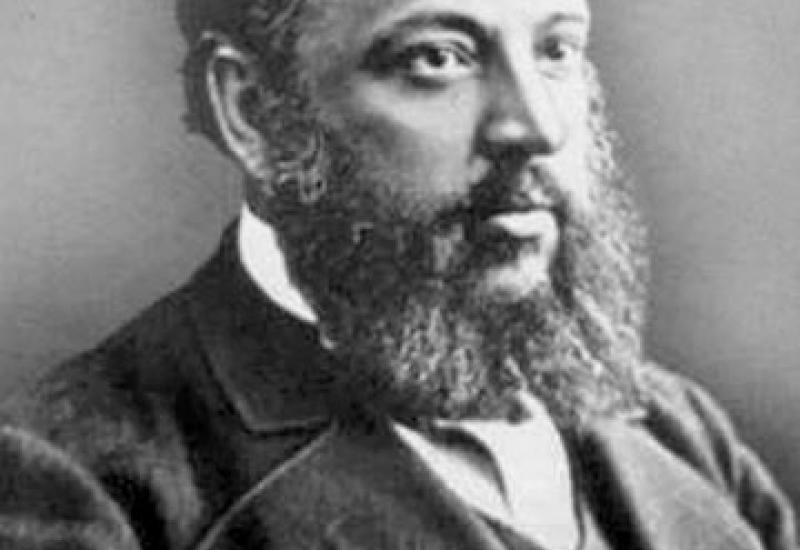Pavlo P. Chubynsky (born 15 [27] .01.1839, countryside near Boryspil – died 17 (29) .01.1884, Kiev) - famous ethnographer, poet and journalist, a lawyer, an active leader of the Ukrainian national movement in Right-Bank Ukraine. Pavlo Chubinsky came from Ukrainian gentry. His ancestor was Cossack Ivan Chub, buried in Boryspil. However, the great-grandfather has been known for more "noble" surname - Chubinsky.
Parents sent Pavlo to the Second Kiev Gymnasium. Now at this place (Boulevard Taras Shevchenko, 18) is installed a memorial plaque. After high school Chubinsky was enrolled Petersburg University, where he earned a law degree (1861), received a Master of Laws degree.
As a student, he participated in the activities of the Ukrainian community in St. Petersburg. He was the author of the magazine "Osnova” (basis). At meetings of "Osnova" editorial board he had the opportunity to meet personally with luminaries of Ukrainian culture Nikolai Kostomarov, Panteleimon Kulish, but above all - Taras Shevchenko, who always remained for him a spiritual teacher, a guide to the life and work.
October 20, 1862 the chief of gendarmes Prince Dolgorukov gives an order to send Chubinsky "for harmful effects on the minds of the common people" ( for the Ukrainian activities) to live in Arkhangelsk province under police surveillance. A year later he settled in Arkhangelsk, where worked as an investigator, then Secretary of the Statistics Committee, the provincial newspaper editor, officer on special assignments at the governor. During the seven years of exile in Arkhangelsk Ukrainian Chubinsky did a lot for Russian science, in particular wrote a study about the fairs in the Arkhangelsk Region, mortality in the Arkhangelsk area, on the Pechora region, trade in the northern provinces of Russia, researched legal practices in the province, and others.
In 1869 he received permission to return to Ukraine and headed ethnographic statistical expedition of the Russian Geographical Society in the South West region.
Within two years, the expedition explored the Kyiv, Volyn, Podolia, part of Minsk, Grodno, Lublin, Siedlce provinces and Bessarabia, inhabited by Ukrainians.
The basis of the text of the song "Ukraine Has Not Yet Perished" to music by M. Verbitsky, Pavlo Chubinsky put motifs from mazurka "Even Poland has not perished" and songs of Serb rebels, where were the words "Heart beats and blood flows for our freedom."
There are several versions of the song.
The text was written for half an hour in 1862 in Kiev on the street Bolshaya Vasylkivska, 122, in the house of the merchant Lazarev, where the author lived at that time.
The poem was published for the first time in the fourth issue of the magazine "Meta", which was released in December 1863.
In Tsarist Russia the song "Has Not Yet Perished Ukraine" was first published in 1908 in the anthology of Ukrainian Muse.
The results of the expedition were included in seven volumes of "Proceedings of ethnographic statistical expedition to the West Russian region." They were published in St. Petersburg in 1872-1879, respectively. The publication contained a surprisingly valuable and diverse ethnographic and folklore materials: legends, fairy tales, folk songs, national calendar. The survey included also the local dialects, peculiarities of food and clothing, the data on accommodation Poles and Jews, county courts and the like. Interestingly, the development of the mentioned volumes was attended by composer Mykola Lysenko: he put on the music theme of ritual songs.
Pavlo Chubinsky worked in extremely difficult conditions of persecution by the tsarist government of Ukrainian culture and during his short life managed to do so much that, in the words of his friend and collaborator Fedor Vovk, his services would be enough for a few professional scientists.
And in the heart Chubinsky there was a poet. He was particularly fond of rhyming in his youth. 1871 in Kiev, there was a collection of his poems (though without the author's name) "Svirel Pavlik." It contained lyric poems, mostly on national samples. It attracted by spontaneity and sincerity of feelings of the poet.
Public engagement Chubinsky, thanks to his versatile talent and inexhaustible energy, was manifested in various fields.
Chubinsky became the main initiator of the opening in 1873 of the Kiev Southwestern Division of the Imperial Russian Geographical Society, he worked as a clerk, and from 1875 - Deputy Chairman.
According to the plan Chubinsky and largely under his dynamic leadership 2 March 1874 it was carried out the first one-day census of the inhabitants of Kiev (similar event occurred only in St. Petersburg, 1869). Thanks to an ingenious organization, attraction to cooperate (as registrars) of students, the event was crowned with excellent results – the description of the relief pattern of the population Ukrainian city.
In April 1879, Pavlo Chubinsky resigned and returned to his family's farm.
In 1880 he was seriously ill, and until his death he was bedridden, and 14 (26) in January 1884, just one day before his 45th birthday, he was gone.
The point Pavlo Platonovich was continued by Golovatsky, Ivanov, Rudchenko Hrinchenko Manzhura, Hnatiuk, Franco, Yavornytsky, Novitsky, Miloradovich Sumtsov, Sherbakovskiy, Bilyashivsky.
His poem "Ukraine Has Not Yet Perished" the concentrated expression of patriotic feelings, won a rare summit of poetry - has become a consummate expression of national aspirations, symbol of the nation.

